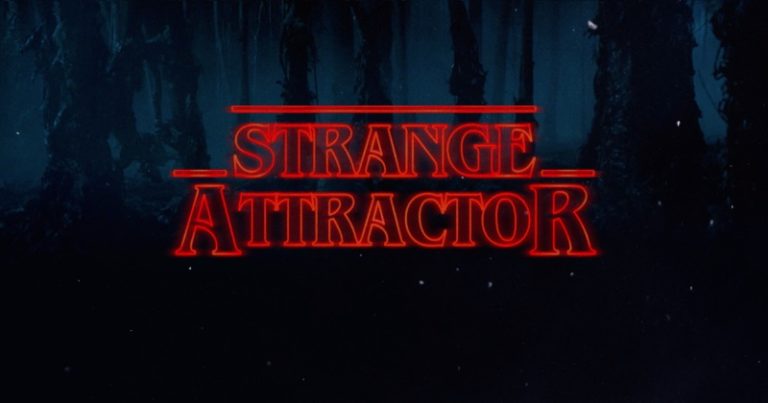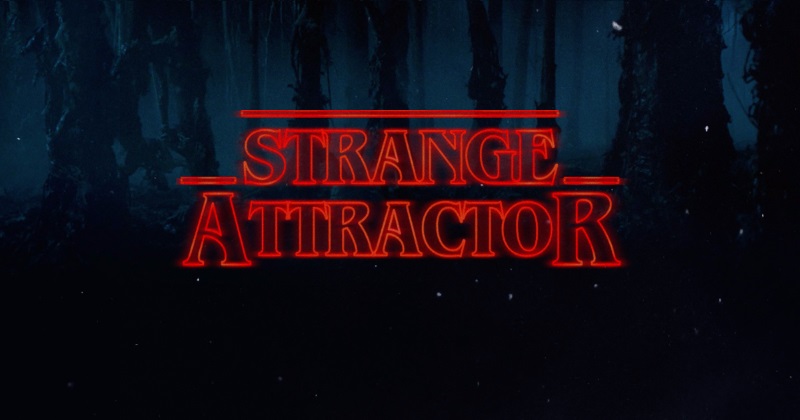
Are there secrets to conjuring outstanding concepts that will compel and engage readers and audiences? Hollywood screenwriter Terry Rossio (Aladdin, Shrek, Pirates of the Caribbean franchise) seems to have found one in his Strange Attractor blog post.
It's often difficult to define what makes a movie concept compelling or ordinary. Some ideas seem to jump off of the page in perfect 30-35 word loglines while others come off as dull, stagnant, and unexciting.
Rossio was one of many that couldn't pinpoint what made a movie concept special enough to entice readers and audiences to embrace them with pure interest and intrigue. He'd read screenplays that technically had great structure, characters, story, dialogue, and scene description, yet he'd still know full well that those scripts would never get purchased or made. Why? Because they were missing that special something — the Strange Attractor.
It was a term that he stole from fractal geometry — an attracting set that has zero measure in the embedding phase space and has fractal dimension. Now, that definition clearly has no bearing in screenwriting or screenplays.
Rossio clarified:
I know this sounds a bit silly, but bear with me. Put strange (meaning "unique") and attractor (from "attractive," meaning "compelling") together and you get strange attractor, or "something unique that is also compelling."
What he is saying is that the concept of your movie should be unique — something that hasn't been done before — while at the same time it must attract people to it.
Some call it a gimmick, hook, or twist. We often refer to it as high concept. But Rossio is quick to dictate the difference between high concept and strange attractors.
You could substitute high concept for strange attractor, but I think strange attractor is more precise. What good is a short, simple idea for a movie if it doesn't also attract people?
For example:
A man wrongly convicted of murder runs his investigation from the confines of his jail cell.
Okay, this is mildly intriguing. You could use this high concept to write a screenplay. It might turn out to be the springboard for a good movie — but a lot depends on the execution, all the way down the line. But even granting that a film did eventually get made, and made well, it still could be a tough sell to an audience.
So from a studio or development perspective, then, this high concept is not likely to generate a lot of excitement... or entry into the industry for the beginning screenwriter.
An idea that's marginally better (in a purely commercial, make-a-
sale-to-Hollywood sense) is:A man wrongly convicted of murder learns to astral-project himself out of his jail cell; he must locate the real killer in order to clear his name.
Still, as hokey as this sounds, at least it has an identifiable strange attractor — the gimmick of leaving jail through astral projection. Perhaps it could be done as a comedy, with nice thematic statements about freedom and overcoming limitations. You get the idea, even with the above arguably bad example.
In Rossio's eyes, a good attractor must intrigue people and appeal to people. And the best ones also explore human condition that is specific and universal.
When you offer something strange within your concept, it's something we haven't seen before. That's intriguing. And the attractor can often end up being something familiar that allows us to relate to that strange aspect. Something that grounds it.
Carson Reeves of ScriptShadow builds on Rossio's definition of Strange Attractor:
The Strange Attractor is basically what makes your idea unique. A couple of brothers going to a remote island to connect with their estranged aunt? No Strange Attractor there. A couple of brothers going to an island of dinosaurs to connect with their estranged aunt, who runs the place? Now you have your Strange Attractor.
Take the time travel out of Back to the Future, the superheroes out of Avengers, the "stuck alone on Mars’"out of The Martian, and you’ve lost all of their Strange Attractors. Now you might say, "Well duh, Carson. You don’t have a movie if you take those things away. They’re the entire film!"
Yeah but see here’s the thing. I READ all those scripts that have those things taken away. I’ve read that indie script about a guy who tries to reconnect with his parents. That is, essentially, Back to the Future without its Strange Attractor. I’ve read that boring script where a group of friends gets into shenanigans in their middle-of-nowhere town. That is, essentially, Avengerswithout its Strange Attractor.
It's often tricky for studio readers, development executives, managers, agents, and producers to communicate what makes specific scripts stand out from the rest. Even when you read screenplays that do all of the right things — great structure, great stories, great characters, great format — that doesn't mean that they should be purchased and given the green light for production.
It takes more than that. And Rossio's Strange Attractor concept is one that does the best job of defining the seemingly undefinable magic of discovering those special screenplays.
In Memento, the story of a man trying to track down his wife's killer is undoubtedly compelling. But the Strange Attractor is the addition of the fact that he suffers from short-term memory loss and must trust clues that he has tattooed onto himself.
In A Quiet Place, the story of a family surviving in the woods after an alien race has conquered their planet is somewhat compelling — albeit familiar. But the Strange Attractor is the addition of the concept that the aliens are attracted by sound. Thus, the family has to live in utter silence or be killed by the sound-sensitive beasts.
In Jurassic Park, the story of characters visiting an island zoo populated by DNA-generated dinosaurs is interesting. But the Strange Attractor is the addition of the plot point that has the park's security systems failing, forcing those characters to survive amongst the dinosaurs they were previously in awe of.
The Strange Attractor is so vital to a spec script's selling point.
But how do you find them?
There's no single answer. Just being aware of the need of them puts you, the screenwriter, a few steps ahead of the competition. Asking yourself, "What's my concept's Strange Attractor?" will get your creative juices flowing.
As a bonus, Rossio offered the best guidance he could give — eight common quality attributes that most compelling Strange Attractor concepts can be found within.
1. Larger World Revealed
Thematically, some of the best film concepts reveal the world to be a larger, more magical, and more complex place than is commonly believed. That, or how much larger, more magical, and more complex the human spirit is than is widely believed. The Harry Potter films do a masterful job of presenting a larger, more magical, and more complex world.
2. Universal-ness
Universal concepts and themes are a very easy way to find Strange Attractor concepts.
What if the myth of monsters in our closets was real? (Monsters Inc.)
What if the desire in our youth to become an adult actually happened overnight? (Big)
What if the curiosity of meeting our parents in their own youth came true, thanks to time travel? (Back to the Future)
3. Classic Echoes
Many popular movies use classic story themes from classic dramas and fables.
The underdog story is prevalent in popular hits like Rocky and The Rookie. Babe shows shades of classic literature like Charlotte's Web, Watership Down, and Animal Farm.
4. Implies a Situation
Many Strange Attractor concepts utilize a situation. The situation sets the concept, and the delivery of that concept is a direct result of the situation that protagonists are put in.
John McClane is a New York City cop that comes to visit his estranged wife and kids in Los Angeles, hoping to fix his marriage. The situation he's thrust into is the final element of the Strange Attractor — terrorists take over his wife's office building that McClane is visiting during her company's Christmas party and he's the only one that can save them.
5. Behind the Scenes
Audiences love a peek behind the scenes, whether it's seeing what it's like to play in the minor leagues (Bull Durham) or witnessing what it takes to be a hotshot fighter pilot (Top Gun).
And you can also take us behind the scenes of worlds we could never have imagined. Harry Potter shows us what it might be like if there was a school for wizards. Who Framed Roger Rabbit? shows us what it would be like if cartoons were real beings.
6. Good Roles (and Good Titles)
Writing a unique and exciting character can often be a defining part of the Strange Attractor concept. That character can be the concept overall. Case in point, Forrest Gump. That character is the concept of that film (and the book it was based on). And it's a role that many wanted to play.
Good Will Hunting is an excellent example of that approach as well, even though its star wrote the script.
And good titles can certainly make a difference too, although Rossio makes a good point that relying on a good character or good title to sell a script isn't a smart bet. It's very difficult to do and you have to display an immense range of talent.
Read ScreenCraft's How to Write Screenplay Titles That Don’t Suck!
7. Concept Cannot Be Done Again
When you choose a concept that hasn't been done and fully explore all major facets of that concept, you've written something that cannot be done again — that can be compelling to Hollywood and could force them to act now or miss out on something special.
When Twister was released, no other significant films for decades tried to tackle that subject.
Years before that, when Splash debuted, no other Hollywood films wanted to touch the subject of mermaids (Disney's animated classic notwithstanding).
8. Known Elements
Rossio offers a fantastic example that all screenwriters need to read:
Good film concepts tend to utilize elements that already exist within the awareness of the audience.
For example, a writer was pitching a story to me recently along the lines of: Magical chimney fairies steal a child's favorite napkin, and take it to the lost land of Maypole. The kid travels on a backwards bicycle to the magical land, and gets his napkin back.
I was trying to figure out what was wrong with this. After all, Winnie the Pooh has elements just as fanciful, as do films like Mary Poppins and Star Wars. Then again, those weren't spec script sales. It finally hit me — none of those elements pre-existed in my mind, which made connecting to each one an effort.
I've heard of fairies, but not any that live in chimneys. Since when do kids fall in love with their napkins? This falls outside my realm of experience. Similarly, the "Lost Land of Maypole" and the "Backwards Bicycle" are unknown elements.
In contrast, consider the individual elements in the film Liar, Liar. A kid (I get that) makes a birthday wish (okay) that his father, a lying untrustworthy lawyer (that's easy to believe) has to tell the truth (uh-huh) for twenty-four hours. Each of these elements is familiar — they already exist in my head, ready for the filmmaker to manipulate. The overall concept can then be easily promoted, marketed, or advertised, as there exists in the audience an awareness that can be reached. (This may be what executives mean when they say they want something new and different, but also time-tested and proven.)
Ken Miyamoto has worked in the film industry for nearly two decades, most notably as a studio liaison for Sony Studios and then as a script reader and story analyst for Sony Pictures.
He has many studio meetings under his belt as a produced screenwriter, meeting with the likes of Sony, Dreamworks, Universal, Disney, Warner Brothers, as well as many production and management companies. He has had a previous development deal with Lionsgate, as well as multiple writing assignments, including the produced miniseries Blackout, starring Anne Heche, Sean Patrick Flanery, Billy Zane, James Brolin, Haylie Duff, Brian Bloom, Eric La Salle, and Bruce Boxleitner. Follow Ken on Twitter @KenMovies
For all the latest ScreenCraft news and updates, follow us on Twitter, Facebook, and Instagram.
Tags
Get Our Screenwriting Newsletter!
Get weekly writing inspiration delivered to your inbox - including industry news, popular articles, and more!



























